Miners' strike: The lifesaving women of County Durham
- Published
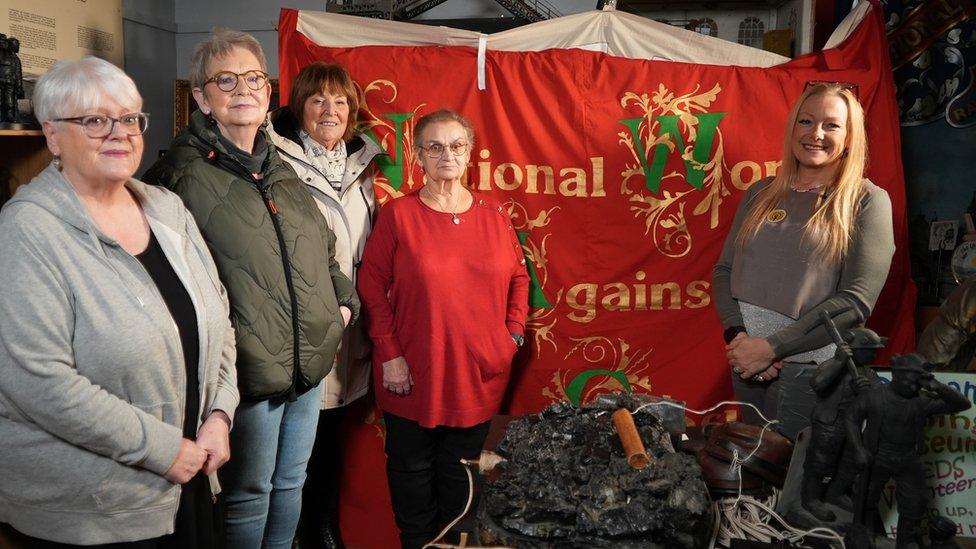
Women from County Durham proved lifesavers during the 1984 miners' strike
Forty years ago, miners across the country walked out at the start of a bitter, year-long strike. While the focus was predominantly on those manning the picket lines, behind the scenes were groups of women offering strength and the most vital support.
The phone would ring in the dead of night and, each time she answered it, Heather Wood knew who it was likely to be.
The voice would be that of a striking miner reaching the end of his tether.
"They'd wait until their wives had gone to bed," Heather recalls, adding: "They were going to kill themselves because they couldn't pay the electricity bills.
"I had hundreds of people contact me, particularly men, and it was always during the night."
For 12 months from the spring of 1984, this was Heather's life as part of the network of support groups helping miners and their families through the long dispute with the government and National Coal Board.
As the men of the National Union of Mineworkers prepared to walk out, Heather was one of an army of wives, grandmothers and daughters falling in behind them.
Heather, who had spent her life in the County Durham pit village of Easington, saw the urgent need to recruit the colliery women to the cause.
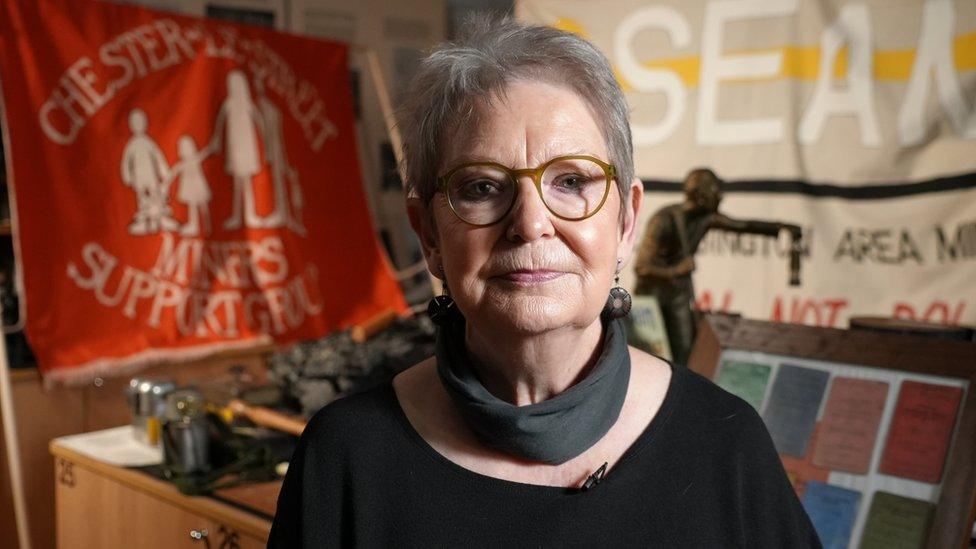
Heather Wood set up support groups in County Durham
"If those women hadn't supported the miners, the strike would've collapsed," she says, adding: "I've no doubt about that.
"I was happy the miners had decided to strike. I couldn't just let them battle it out themselves."
Heather sent letters to every woman in Easington. Word spread until there were 14 support groups in East Durham, as well as one covering the whole county and the national Women Against Pit Closures.
Those groups would feed and help families as the strike threatened to bring many to their knees, but they also changed the lives of the women who ran them.
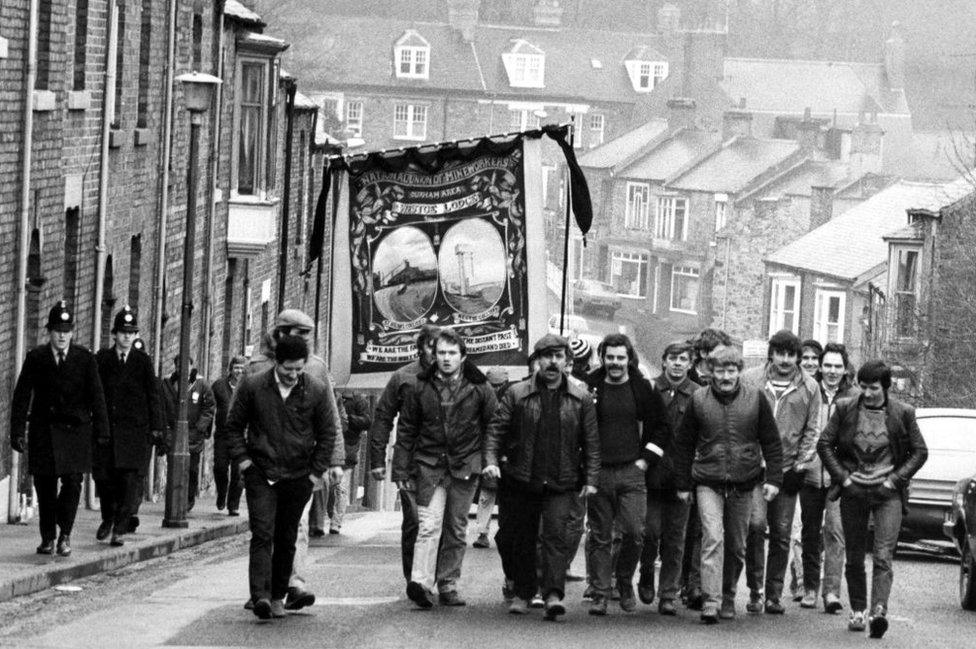
Communities across County Durham supported the striking miners
As the strike progressed, the hardship of months without pay led to desperation.
While the free cafes providing food to miners and their families became well known, the support groups were, Heather says, quite literally a lifesaver.
"People who never had to ask for help, very proud people, came to someone they could trust," she recalls.
"The women decided we needed to be an organisation that didn't solely make meals, we had to give information and advice."
The groups would produce leaflets and magazines and signpost miners to specialist help like the Citizens Advice Bureau.
Meanwhile, the women became activists, joining the increasingly violent picket lines as police cleared the way for strike-breaking miners to return to work.
Others took the fight to Westminster, raising funds and taking part in a national women's rally in support of the miners in August 1984.
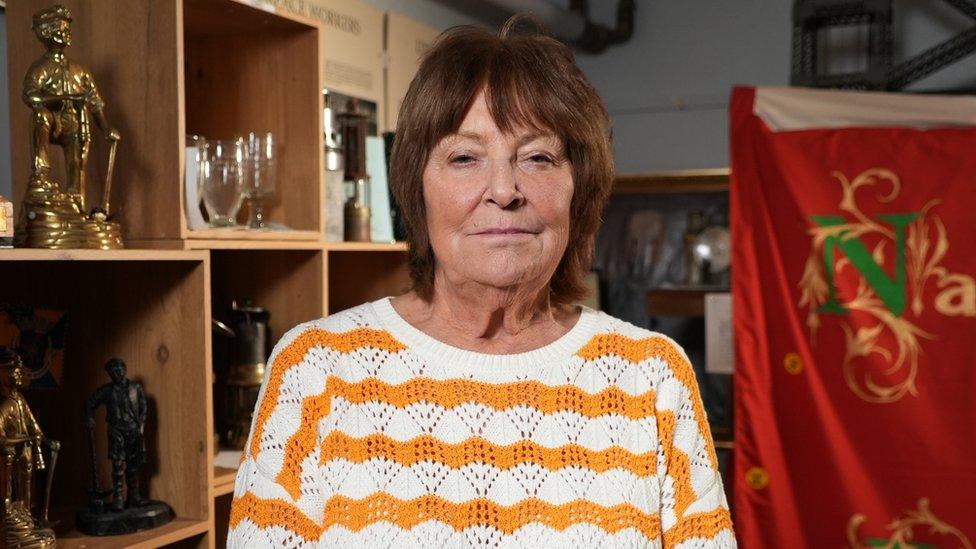
Maureen James joined the throngs going to London to support the miner's strike
County Durham miner's daughter Maureen James vividly recalls the trip south.
"The atmosphere among the women was really good," Maureen says, adding: "The police presence was very intimidating; hundreds and hundreds of riot vans.
"It changed my life, it showed me solidarity. It gave women a voice they never had before and I think the men started to respect that women could do more."
Back home, women tackled the daily indignities of families who had run out of money to provide for their children.
"School shoes was a big thing," remembers Mary Stratford, who was part of a support group covering Lumley and Bournmoor.
"Families couldn't afford to replace them," she says, adding children had no choice but to wear black plimsolls, but "unsympathetic" schools would send them home.
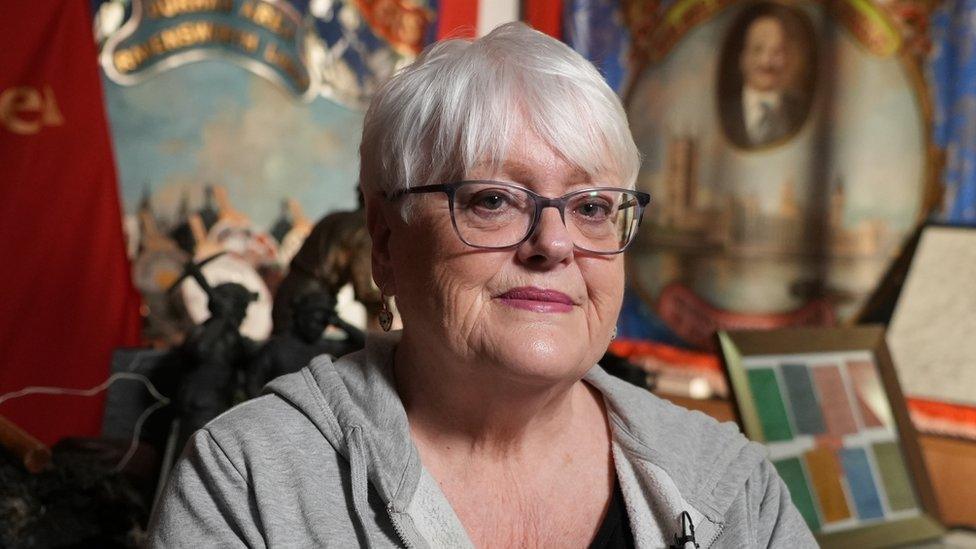
Mary Stratford helped source school shoes for miners' children
"We realised there was a desperate need for shoes," Mary says.
"One councillor got us some cheap ones from Northamptonshire and we were able to supply them at a very low cost. There was a lot of hardship."
The passage of time hasn't dimmed the gratitude felt by some of the children who were helped.
Lynn Gibson, from Spennymoor, was eight when her dad joined the strike and recalls the Christmas gift she received from French trade unionists.
Hundreds of gifts were delivered to a centre at Murton, with Lynn receiving a bag to carry her gymnastics kit.
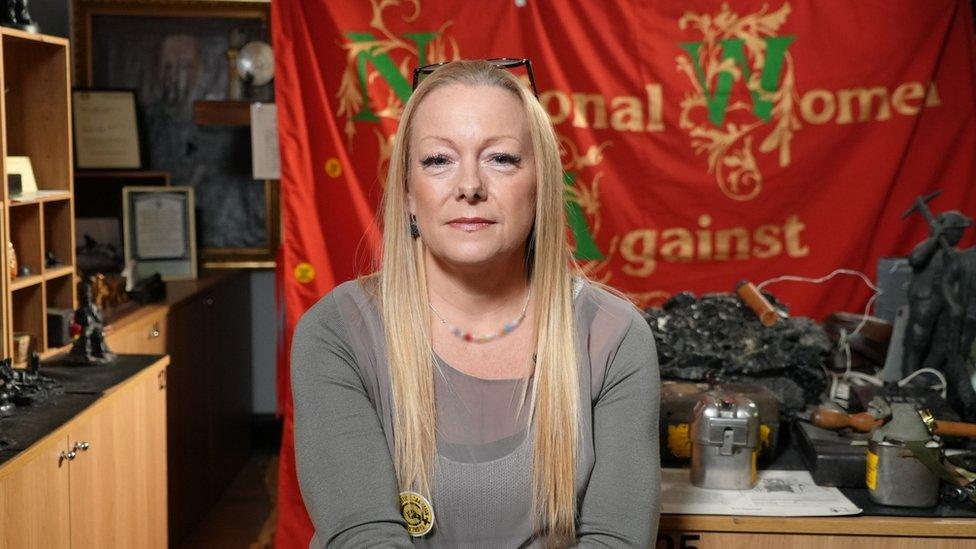
Lynn Gibson is still grateful to the support offered to her mining family
"I remember just before Christmas my dad sat me and my brother down to say he was going to have to take the money out of our Halifax savings accounts to live on," Lynn says.
"It was really hard for him. We were surviving as a family on £20 a week.
"I'd always wanted to meet the woman who'd got me that Christmas present and in 2017 I did meet Heather. It was very emotional to meet the woman who supported me and my family.
"I think it's time to celebrate the work that was done by these women, who have gone nameless ever since.
"The amount of women who became politically active after the strike, who had never left the kitchen sink before.
"They were standing on platforms, they were doing marches, and that has helped my generation."
'The best year'
Juliana Heron, the wife of an Eppleton colliery worker, was one of them.
Now 76, she ended up as mayor of Sunderland.
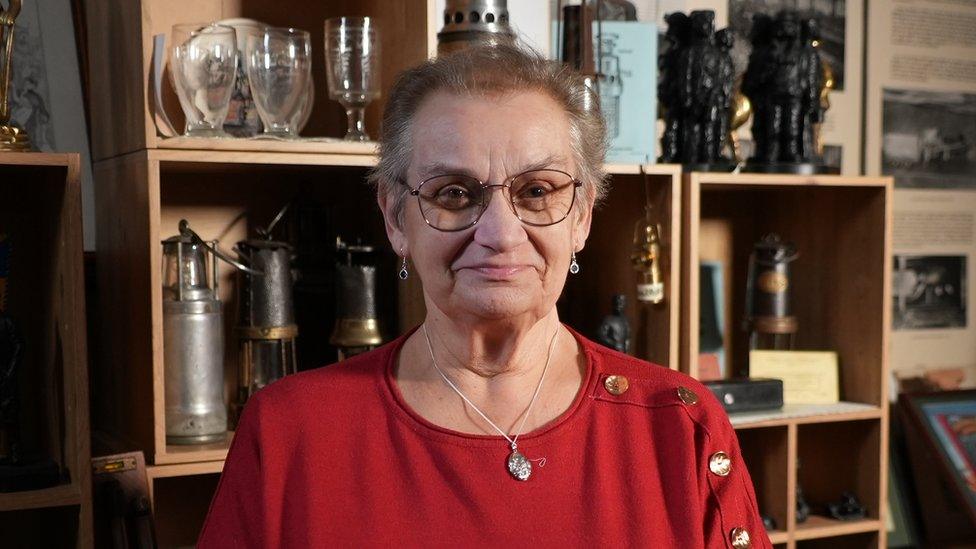
Juliana Heron went from miners' strike to mayor
"It was the hardest year of our lives but it was the best year," she says.
"It brought me in other directions. You never feel lonely and you never feel isolated. It's something I'll never forget."
And that, ultimately, is the strike's legacy for these women of the Durham coalfield.
On the weekend of 2 March, they will gather under their banners and march through Durham city to commemorate the 40th anniversary of the start of the dispute.
The strike had meant women took jobs in factories and found themselves in the role of breadwinner for the first time.
Some went into politics, joining parish and county councils, flush with the confidence gained from running the support groups.
"It changed the way they thought of the world," says Heather.
"They knew they could be part of the discussion - and they also knew what they were capable of doing.
"You can do anything after that."

Follow BBC North East on Facebook, external, X (formerly Twitter), , externaland Instagram, external. Send your story ideas to northeastandcumbria@bbc.co.uk, external.
- Published11 February 2024
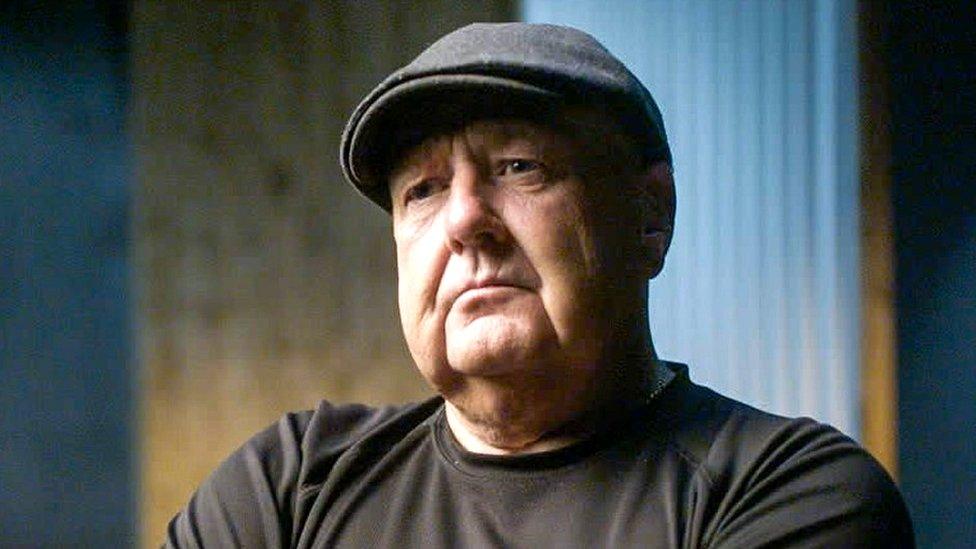
- Published4 December 2021
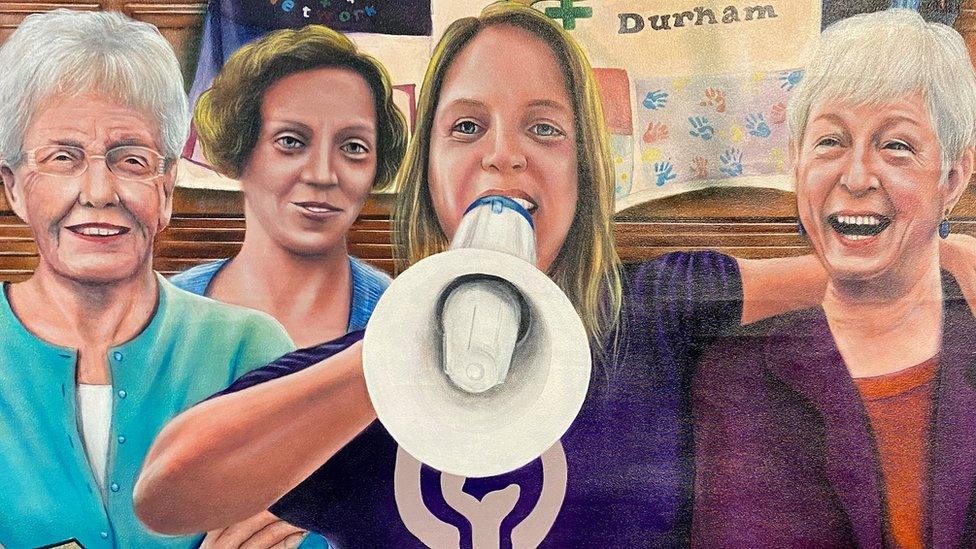
- Published13 January 2014